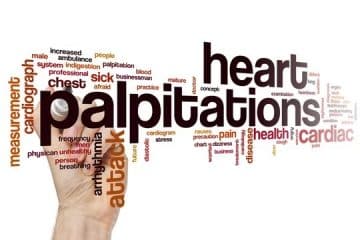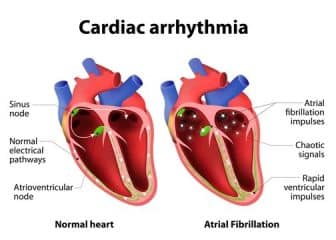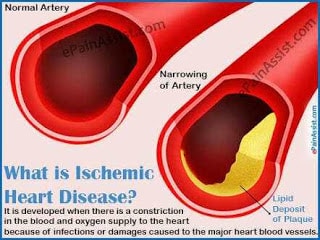Heart palpitations are feelings of having a fast-beating, fluttering or pounding heart. Stress, exercise, medication or, rarely, a medical condition can trigger them.
Although heart palpitations can be worrisome, they're usually harmless.
You may become overly aware of your heartbeat. This sensation can be felt in the neck, throat, or chest. Your heart rhythm may be changing during the palpitations.
Some types of heart palpitations are harmless and resolve on their own without treatment. However, in other cases, heart palpitations can indicate a serious condition. In rare cases, they can be a symptom of a more serious heart condition, such as an irregular heartbeat (arrhythmia) that might require treatment.
Usually, a diagnostic test called “ambulatory arrhythmia monitoring” can help to distinguish benign from arrhythmias that are more malignant.

Prevalence of Heart Palpitations
Heart palpitations are on the rise nowadays because of mostly bad health habits of Nigerian, it is something that should be looked into to prevent recurring cases and hospital cases for Heart Palpitation in Nigeria. Heart Palpitations contribute to one of the prevailing cases that trigger doctor visits in Nigeria.
Considering products like Gundry MD Energy Renew could offer potential solutions to support heart health and mitigate palpitation risks, providing a natural approach to wellness and vitality
Symptoms of Heart Palpitations
Heart palpitations can feel like your heart is:
- Skipping beats
- Fluttering rapidly
- Beating too fast
- Pounding
- Flip-flopping
You might feel heart palpitations in your throat or neck as well as your chest. They can occur when you're active or at rest.
Causes of heart palpitations

Possible causes of heart palpitations include:
- strenuous exercise
- excess caffeine or alcohol use
- nicotine from tobacco products such as cigarettes and cigars
- stress
- anxiety
- lack of sleep
- fear
- panic
- dehydration
- hormonal changes, including pregnancy
- electrolyte abnormalities
- low blood sugar
- anaemia
- an overactive thyroid, or hyperthyroidism
- low levels of oxygen or carbon dioxide in the blood
- blood loss
- shock
- fever
- over-the-counter (OTC) medications, including cold and cough medications, herbal supplements, and nutritional supplements
- prescription medications such as asthma inhalers and decongestants
- stimulants such as amphetamines and cocaine
- heart disease
- arrhythmia, or an irregular heart rhythm
- abnormal heart valves
- smoking
- sleep apnea
Some heart palpitations are harmless, but they can indicate an underlying illness when you also have:
- congestive heart failure
- a diagnosed heart condition
- heart disease risk factors
- a defective heart valve
When to get immediate medical attention
Seek medical attention right away, if you have heart palpitations and a diagnosed heart problem. Also, seek medical attention if you have palpitations that occur with other symptoms such as:
- dizziness
- weakness
- lightheadedness
- fainting
- loss of consciousness
- confusion
- difficulty breathing
- excessive sweating
- pain, pressure, or tightening in your chest
- pain in your arms, neck, chest, jaw, or upper back
- a resting pulse rate of more than 100 beats per minute
- shortness of breath
These could be symptoms of a more serious condition.
- Recommended reading: Ischemic Heart Disease: Symptoms, Causes, Treatment and Prevention
Diagnosing the cause of heart palpitations
The cause of heart palpitations can be very difficult to diagnose, especially if the palpitations don’t occur while you’re in the doctor’s office or are not caught on the arrhythmia monitor you wear.
Your doctor will conduct a thorough physical exam to identify a cause. Be prepared to answer questions about yourself:
- physical activity
- stress levels
- prescription medication use
- OTC medication and supplement use
- health conditions
- sleep patterns
- caffeine and stimulant use
- alcohol use
- menstrual history
If necessary, your doctor may refer you to a heart specialist called a cardiologist. Tests to help rule out certain diseases or heart problems include:
- blood test
- urine test
- stress test
- a recording of the heart’s rhythm for 24 to 48 hours using a machine called a Holter monitor
- ultrasound of the heart, or an echocardiogram
- electrocardiogram
- chest X-ray
- electrophysiology study to check your heart’s electrical function
- coronary angiography to check how blood flows through your heart
Treatment for heart palpitations
Treatment depends on the cause of your palpitations. Your doctor will need to address any underlying medical conditions.
Some of the time, the doctor isn’t able to find the cause.
If your palpitations are due to lifestyle choices such as smoking or consuming too much caffeine, cutting down or eliminating those substances may be all that you need to do.
Ask your doctor about alternative medications or treatments if you think medication may be the cause.
Preventing heart palpitations
If your doctor feels that treatment isn’t necessary, you can take these steps to decrease your chance of getting palpitations:
- Try to identify your triggers so that you can avoid them. Keep a log of your activities, as well as the foods and beverages you eat and note when you get palpitations.
- If you’re anxious or stressed, try relaxation exercises, deep breathing, yoga, or tai chi.
- Limit or stop your intake of caffeine. Avoid energy drinks.
- Don’t smoke or use tobacco products.
- If a medication is causing palpitations, ask your doctor if there are any alternatives.
- Exercise regularly.
- Stick to a healthy diet.
- Minimize alcohol intake.
- Try to keep your blood pressure and cholesterol levels under control.



